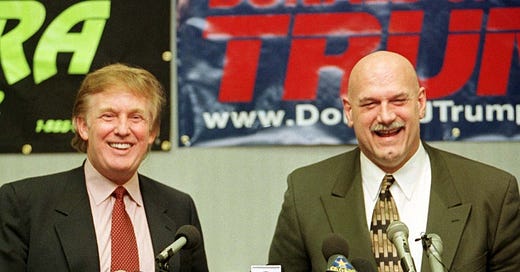Video version:
Jesse Ventura’s name once stood as a symbol of political rebellion, a maverick who could bring the establishment to its knees. From his rise as an independent governor of Minnesota to his flirtations with the Libertarian and Green Parties, Ventura's political trajectory was one of defiance against the rigid structures of American politics. For many, including myself, he was an inspiration—a figure who proved that an outsider could challenge both Republicans and Democrats alike.
But his recent endorsement of Kamala Harris, a cornerstone of the Democratic establishment, signals the fall of an independent icon who once championed the very principles he now seems to have abandoned. To fully understand this dramatic shift, we need to look at Ventura’s political history in its entirety—a story that begins with his influence on Donald Trump, traverses his engagement with third parties like the Libertarians and Greens, and ends with his shocking turn toward mainstream politics.
The Trump Influence: Jesse as a Political Pioneer
Long before Donald Trump’s rise to power, Jesse Ventura was laying the groundwork for a brand of politics that challenged the status quo. In many ways, Ventura was the prototype for Trump’s anti-establishment rhetoric. Both men came from outside the political arena—Trump from business and Ventura from professional wrestling—and both leveraged their celebrity status to connect with a disillusioned electorate.
In 1998, when Ventura ran for governor of Minnesota as a member of the Reform Party, no one took him seriously. Yet his unexpected victory demonstrated that an outsider could tap into the frustrations of voters who felt abandoned by both major parties. Like Trump, Ventura spoke plainly, attacked the political elites, and presented himself as the candidate who didn’t owe anything to special interests. His win was a precursor to the populist wave that Trump rode two decades later.
However, while Trump took Ventura’s anti-establishment playbook and used it to build a cult of personality within the Republican Party, Ventura maintained his independence, repeatedly expressing disdain for both parties. This critical difference set Ventura apart—he remained committed to third-party politics, refusing to align himself with either side of the bipartisan divide.
Before Donald Trump became a dominant figure in the Republican Party, he attempted to enter politics through more unconventional avenues—one of those being the Reform Party. In 2000, Trump sought to run as the Reform Party candidate and aligned himself with Jesse Ventura, seeing Ventura’s victory as Minnesota governor as proof that an outsider could win. Though a Trump/Ventura ticket never materialized, Trump's interest in Ventura reflected a recognition that Ventura’s brand of anti-establishment politics could resonate with disillusioned voters.
Trump wasn’t done with Ventura, either. According to actor Woody Harrelson, Trump also tried to recruit Ventura in 2004 to run with him, this time as a Democrat. While Ventura remained independent, Trump was already laying the groundwork for the political persona that would eventually dominate the Republican Party in 2016—a persona heavily inspired by Ventura’s outsider appeal and rejection of establishment norms.
The Libertarian and Green Party Chapters
After his half Reform/half Independent term as governor and his deepest involvements with a pre-GOP Trump, Ventura solidified himself as an outspoken advocate for third-party politics. His philosophy aligned with the Libertarians on key issues such as government overreach, civil liberties, and personal freedom. In 2012, he voted for Libertarian candidate Gary Johnson, signaling his support for a political option outside of the Democratic and Republican strongholds. By 2016, Ventura flirted with the Libertarian Party again, but also considered a VP run with Trump before ultimately being passed over for the vice-presidential spot in favor of Mike Pence on the Republican ticket. This snub led Ventura to endorse Gary Johnson over Donald Trump in the 2016 election. However, his disdain for Trump didn’t push him fully back towards the Libertarian Party; instead, he cast his vote for 2016 Green Party candidate Jill Stein.
While Jesse briefly flirted with running for president as a Libertarian in 2016, recognizing that the party offered a vehicle for challenging the entrenched power structures of the Democrats and Republicans, Johnson wanted his second nomination and Trump was forced to select an establishment VP in 2016. However, Ventura’s views often veered left on economic matters, making a permanent alliance with the Libertarians a poor fit let alone the GOP.
It was during this period that I, along with others in the Green Party, found Ventura’s voice appealing. He criticized corporate greed, supported environmental causes, and spoke out against war—all key tenets of the Green Party platform. Ventura appeared at Green Party events, further positioning himself as a viable third-party candidate who could unite disaffected voters from across the political spectrum. Then came the fruits of an on and off thing since 2014… In 2020, I Co-Chaired the Ventura Presidential Exploratory Committee then Chaired the Jesse Ventura/Cynthia McKinney 2020 ticket, one of the hardest and best periods of my life.
Yet, despite his flirtations with both the Libertarians and the Greens, Ventura never fully committed to either party. His reluctance to take on a formal leadership role reflected both his independent streak and perhaps an aversion to the organizational infighting that plagued these movements. Still, his involvement lent legitimacy to both parties, and his potential candidacy continued to inspire hope among third-party activists.
Endorsing Kamala Harris
This is why Ventura’s eventual endorsement of Kamala Harris came as such a shock. For those of us who had followed Ventura’s career, who had seen him rise as an outsider and a challenger of the establishment, his decision to back Harris felt like a betrayal. Harris, after all, is a figure firmly entrenched within the Democratic Party—someone who embodies the very political machine Ventura once railed against.
In many ways, Ventura’s endorsement of Harris represented not just a shift in his personal politics, but the abandonment of the independent movement he had helped build. His reasoning was both simplistic and disheartening: he stated publicly that he wanted to see a woman become president before he died. While the desire for a female president is understandable, it is hard to accept this as the rationale for endorsing a candidate like Harris, who represents the political establishment Ventura had spent his career fighting.
Personal Disillusionment: COVID-1984 and the Final Break
My personal relationship with Ventura also took a dark turn during the COVID-19 pandemic. Along with Cynthia McKinney, I had several phone conversations with Ventura regarding what I call "Covid-1984"—the authoritarian measures governments were imposing under the guise of public health. We were concerned about the erosion of civil liberties, the mandates, and, most importantly, the vaccine rollout.
Ventura, who had once been a champion of questioning authority, showed an unexpected allegiance to the establishment narrative. When Cynthia expressed her refusal to take the COVID-19 vaccine, Ventura dismissed her concerns, calling her "crazy" for her stance. His dismissal was not just shocking—it was profoundly disappointing. This was the man who had always told us to question, to resist government overreach, and now he was toeing the line.
It got worse. During one of our last conversations, Ventura told me in no uncertain terms to never contact him again. For someone who had once been a voice for freedom and independence, this abrupt end to our relationship was devastating. It was clear that the man who had once inspired us had changed irrevocably, I have my own suspicions but while they are indeed in line with his brand, this is not a piece for which I’ll posit conspiracy theories.
The Broader Implications: The Green Party’s Protracted Demise
Ventura’s fall mirrors the broader struggles of the Green Party and independent movements in the U.S. What began as a fight for true political alternatives has often succumbed to infighting, marginalization, and a pull toward the Democratic Party. Figures like Howie Hawkins and Jill Stein, while supposedly representing a more radical wing of American politics, have also failed to create a lasting impact. The dream of a true independent challenge to the bipartisan stranglehold feels more distant than ever.
Jesse Ventura could have been a lasting icon of this movement—a figurehead who, like Petra Kelly and to a lesser extent Ralph Nader, continued to fight for an alternative to the two-party system. Instead, his endorsement of Harris and his personal attacks on former allies like Cynthia and myself have revealed a man who has lost sight of his own principles. He’s now done with the fight and is content being a mere weed entrepreneur.
The fall of Jesse Ventura is not just the story of one man’s political decline—it is a reflection of the broader failure of independent movements in America to maintain their integrity in the face of the overwhelming power of the two-party system. Ventura’s decision to endorse Kamala Harris is the final chapter in a career that once offered so much hope but ultimately ended in disappointment.
For those of us who believed in Jesse Ventura, his fall from grace is a painful reminder that even the strongest voices for independence can be co-opted, compromised, or simply give up the fight.
As I reflect on Jesse Ventura’s fall from grace and the erosion of independent third-party movements, I’ve found a new direction in supporting Dr. Shiva Ayyadurai. Dr. Shiva embodies the spirit of anti-establishment politics that Ventura once championed but has since abandoned. His candidacy offers a real alternative to the broken two-party system, with a message focused on decentralization, individual freedom, and systemic change. My experience with Ventura and the Green Party has taught me the importance of staying true to core principles, and in Dr. Shiva, I see a candidate who isn’t afraid to challenge the elites or question the dominant narratives—exactly what America needs now more than ever.












